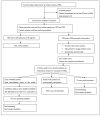Should Perirectal Swab Culture Be Performed in Cases Admitted to the Neonatal Intensive Care Unit? Lessons Learned from the Neonatal Intensive Care Unit
- PMID: 36832316
- PMCID: PMC9955287
- DOI: 10.3390/children10020187
Should Perirectal Swab Culture Be Performed in Cases Admitted to the Neonatal Intensive Care Unit? Lessons Learned from the Neonatal Intensive Care Unit
Abstract
Serial perirectal swabs are used to identify colonization of multidrug-resistant bacteria and prevent spread. The purpose of this study was to determine colonization with carbapenem-resistant Enterobacterales (CRE) and vancomycin-resistant Enterococci (VRE). An additional purpose was to establish whether sepsis and epidemic associated with these factors were present in the neonatal intensive care unit (NICU), to which infants with hospital stays exceeding 48 h in an external healthcare center NICU were admitted. Perirectal swab samples were collected in the first 24 h by a trained infection nurse using sterile cotton swabs moistened with 0.9% NaCl from patients admitted to our unit after hospitalization exceeding 48 h in an external center. The primary outcome was positivity in perirectal swab cultures, and the secondary outcomes were whether this caused invasive infection and significant NICU outbreaks. A total of 125 newborns meeting the study criteria referred from external healthcare centers between January 2018 and January 2022 were enrolled. Analysis revealed that CRE constituted 27.2% of perirectal swab positivity and VRE 4.8%, and that one in every 4.4 infants included in the study exhibited perirectal swab positivity. The detection of colonization by these microorganisms, and including them within the scope of surveillance, is an important factor in the prevention of NICU epidemics.
Keywords: carbapenem; enterobacterales; enterococci; neonatal unit; perirectal swab; resistance; vancomycin.
Conflict of interest statement
The authors declare no conflict of interest.
Figures
References
-
- Stapleton P.J., Murphy M., McCallion N., Brennan M., Cunney R., Drew R.J. Outbreaks of extended spectrum beta-lactamase-producing Enterobacteriaceae in neonatal intensive care units: A systematic review. Arch. Dis. Child. Fetal Neonatal Ed. 2016;101:F72–F78. doi: 10.1136/archdischild-2015-308707. - DOI - PubMed
LinkOut - more resources
Full Text Sources


